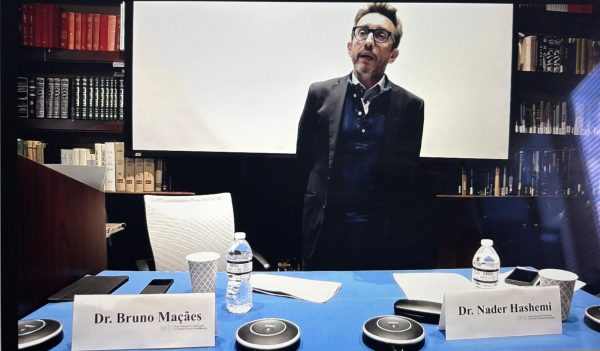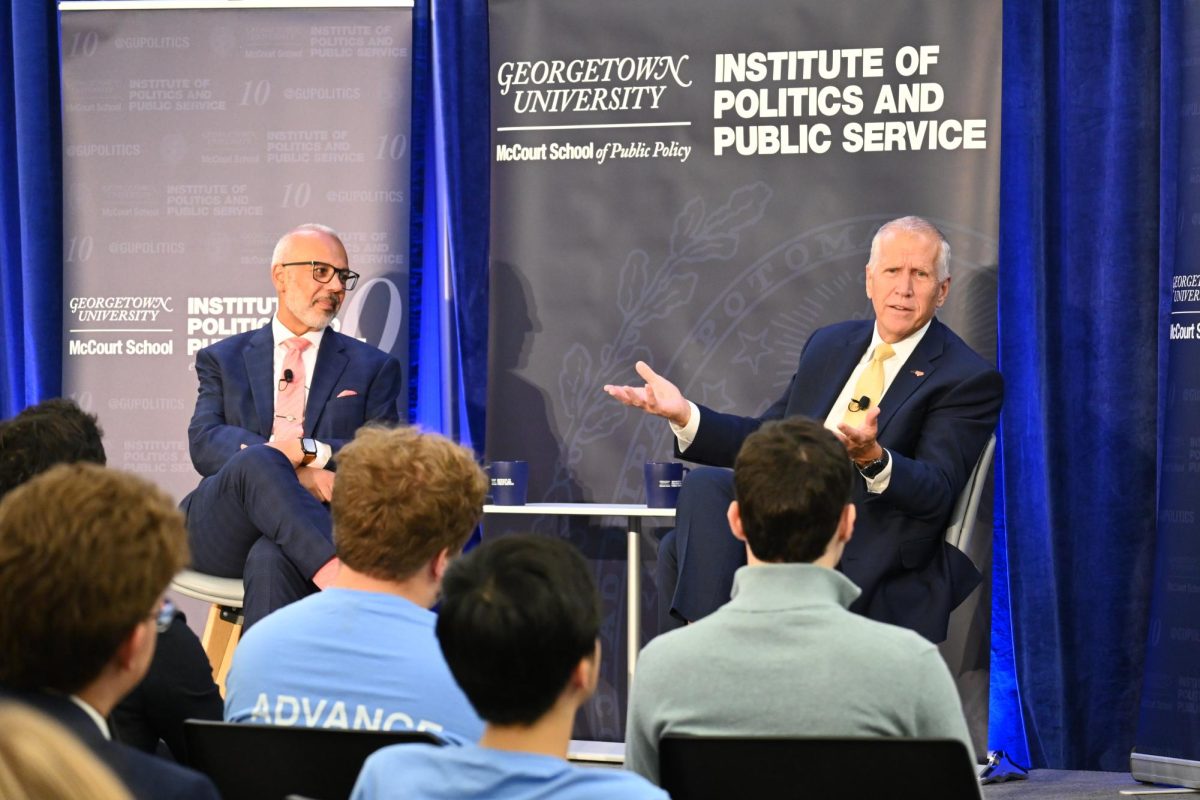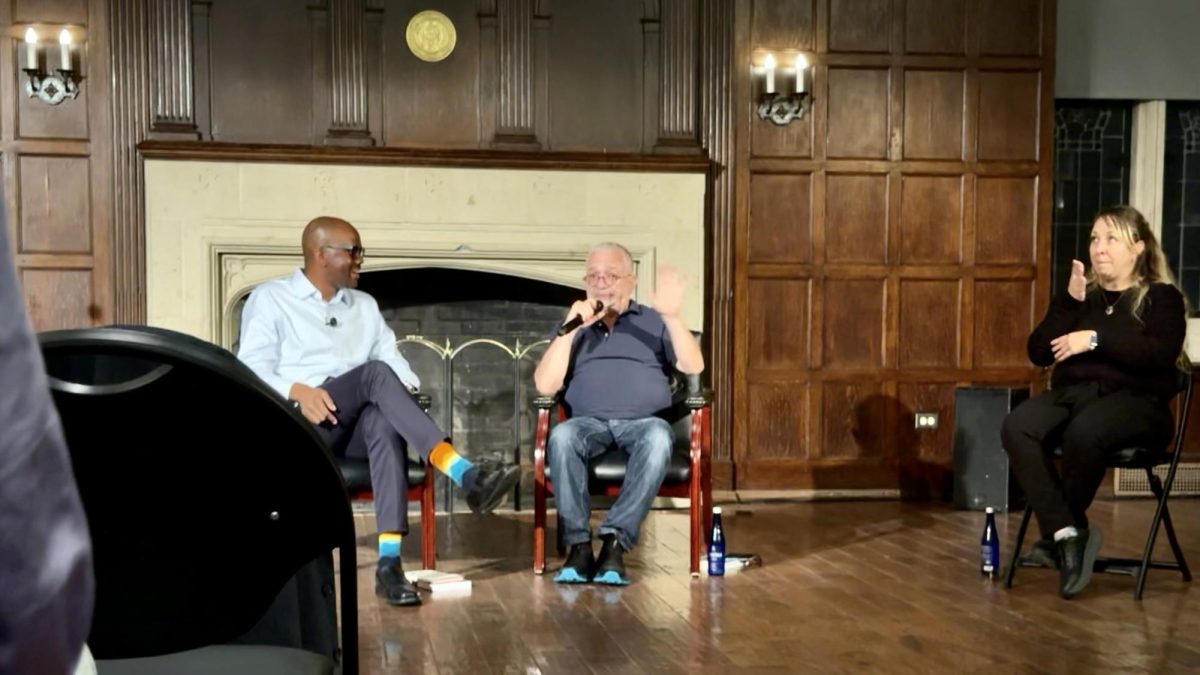A foreign correspondent and former Portuguese cabinet minister urged attendees to consider the moral principles at the core of conflicts in Gaza and Ukraine in a talk at Georgetown University Dec. 2.
During the lecture, Bruno Maçães — a correspondent at The New Statesman, a British news magazine that covers culture and politics, and former Portuguese secretary of state for European affairs — discussed parallels between the Israel-Hamas and Russia-Ukraine wars. The Alwaleed Bin Talal Center for Muslim-Christian Understanding (ACMCU), which seeks to foster interreligious understanding, organized the event in cooperation with the Center for Contemporary Arab Studies, a department that focuses on research in Arab studies, the African studies program and Georgetown University Qatar (GU-Q).
Maçães said there are similarities between the wars in both Ukraine and Gaza and the regions’ respective historical independence struggles.
“We have here peoples that have no doubt about their existence as an independent people, and a long history of struggle for national recognition and national freedom,” Maçães said at the event. “So why are we not applying the same principles in both cases?”
Conflict in Gaza has been ongoing since the establishment of the state of Israel in 1948, which resulted in the displacement of over 750,000 Palestinians. The current war escalated Oct. 7, 2023, when Hamas-led militants stormed Israel, killing over 1,200 Israeli citizens, after which Israel invaded Gaza.
The conflict between Russia and Ukraine began when Russia annexed Crimea in 2014 and escalated Feb. 24, 2022, after Russia launched a full-scale invasion of Ukraine — the largest and deadliest conflict in Europe since World War II, with hundreds of thousands of military and civilian casualties.
Maçães said similarities exist between arguments justifying Israel’s invasion of Gaza and Russia’s invasion of Ukraine.
“It’s a negation of nationality and rightful independence of a people, with perhaps the difference that, in the case of Russia, the goal is to assimilate Ukrainians into a triune nationality of Russians, Belarusians and Ukrainians,” Maçães said. “And in Israel, there is no such attempt to force Palestinians to assimilate an Israeli identity—it’s more a plan of expelling them from what one would regard as Greater Israel, including Gaza and the West Bank.”
Maçães said that in contrast to its support for Ukraine, the U.S. government has defended the Israeli military’s actions in Gaza, which international human rights groups have decried as crimes against humanity.
“The State Department here in Washington, D.C., has moved from saying that Israel is not targeting civilians to saying that it is targeting civilians, but it is necessary because those civilians are mixed up with Hamas fighters,” Maçães said. “We have reached the point where war crimes are not only being excused or ignored, but where they are being defended as a matter of doctrine.”

Maçães’ talk was the 12th in the ACMCU’s Gaza lecture series, which began in January 2024 and examines topics including antisemitism, Islamophobia and genocide.
Nader Hashemi, director of the ACMCU, said Maçães offered an important perspective on the wars in Gaza and Ukraine.
“Most people who are outspoken and principled on Ukraine are silent or unprincipled on Gaza, and vice versa,” Hashemi wrote to The Hoya. “Discussing the similarities and parallels between these two conflict zones and their implications for global order is a unique contribution to the study of international affairs that only someone like Bruno Maçães can make.”
Candy Zhou (SFS ’28), an attendee at the event, said Maçães’ perspective helped her understand the polarizing discussions surrounding the two conflicts.
“As college students, most of our info comes from traditional and social media, which is why his explanation was super informative as to why the response that we see in the media and in discussions is so different when thinking about Gaza versus Ukraine,” Zhou told The Hoya. “I felt I was better able to understand the complex discourse surrounding both topics and the intersection between the two.”
Maçães said that in the future, the global order will shift to an emphasis on force, an idea led by the United States and Europe.
“There’s this transformation of power, where those exercising power essentially argue that because the world has become so much more threatening to us, we have to let go of the principles and pieties and nice things,” Maçães said at the event. “We have to let go of the liberal principles that we have, and we have to embrace the nature of power as just brute force. If I see something that is present everywhere, in Europe and the United States, in forms that are more polite and forms that are less, is this idea that we have to be tough.”







